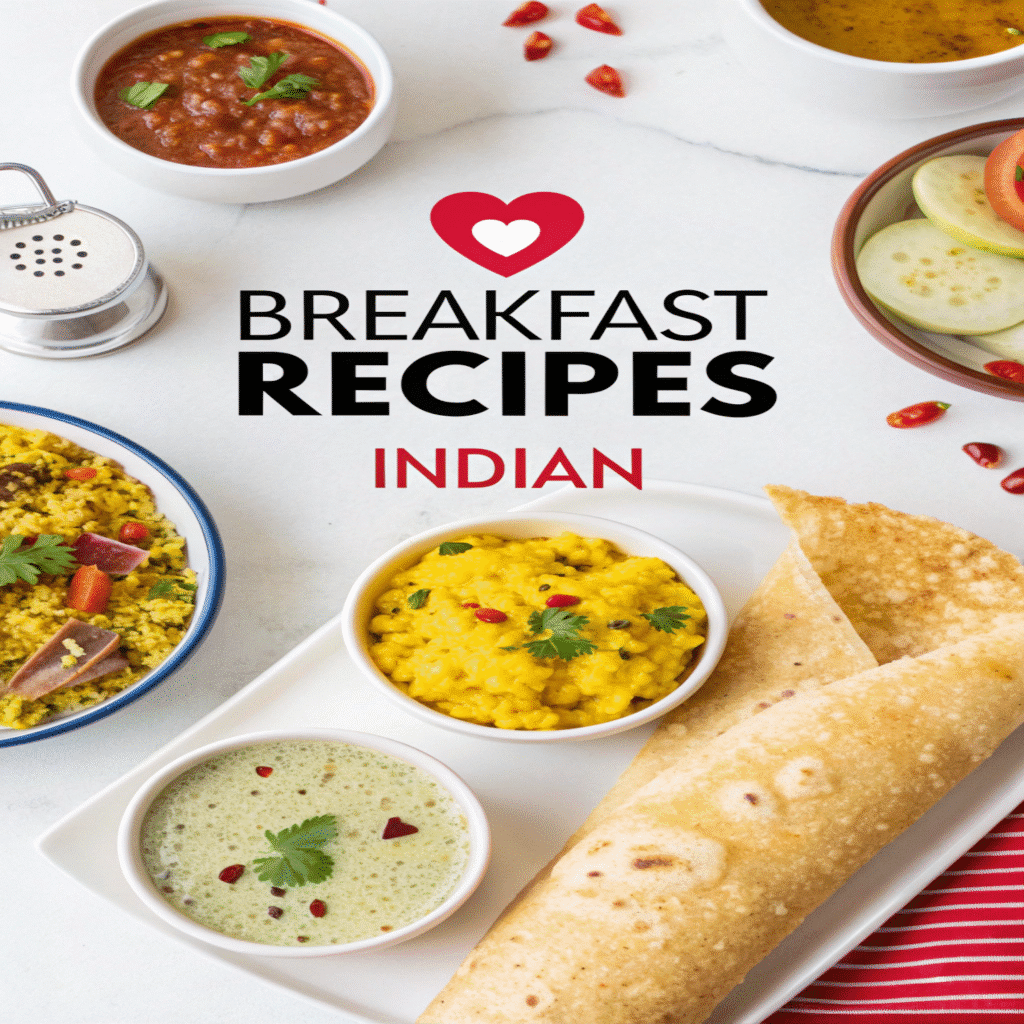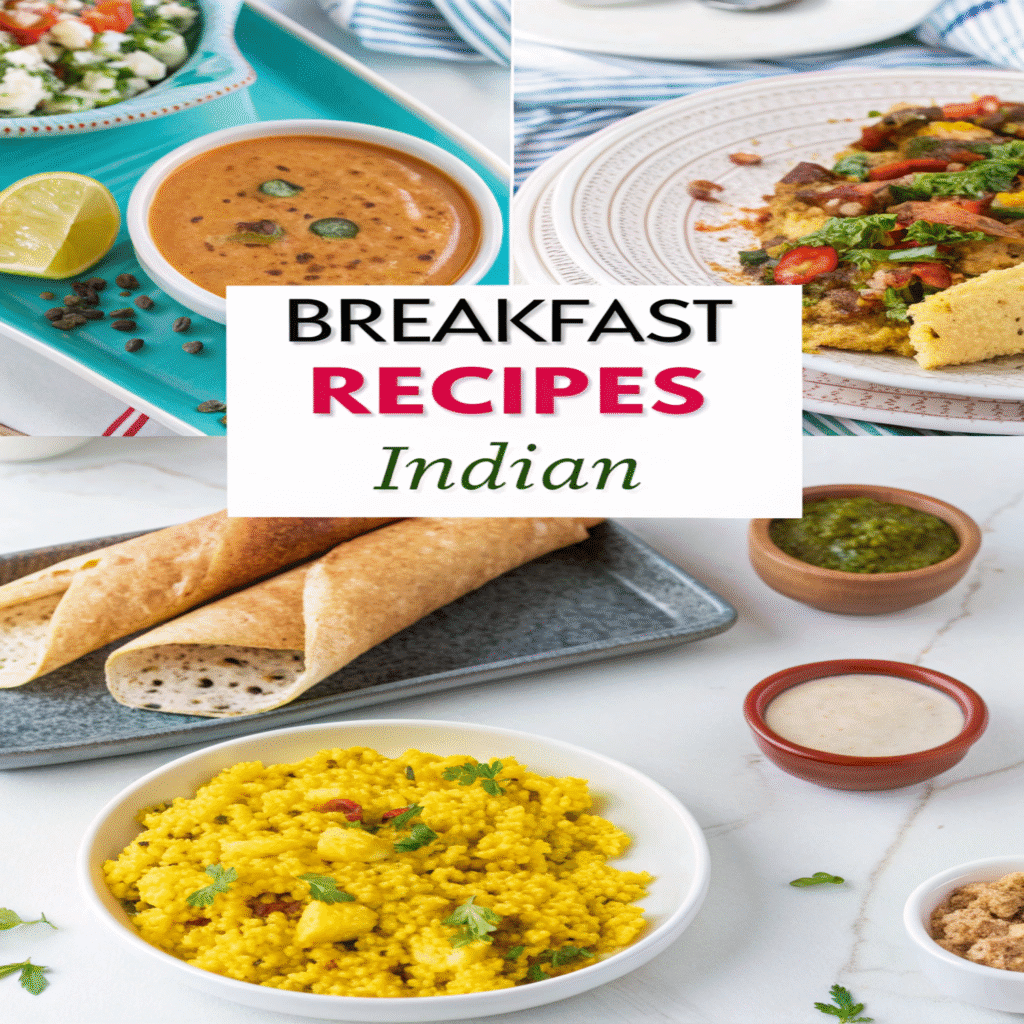
Breakfast recipes Indian style offer a vibrant, flavorful, and nutritious way to kickstart your morning. Indian breakfasts are diverse, reflecting the country’s rich culinary heritage. From savory dishes like dosa and paratha to sweet treats like jalebi, these recipes cater to varied tastes and dietary needs. This article explores the origins, preparation methods, nutritional benefits, and cultural significance of Indian breakfast recipes, ensuring you have everything you need to enjoy a wholesome meal.
What Are Indian Breakfast Recipes?
Indian breakfast recipes encompass a wide range of dishes, each rooted in regional traditions. North Indian breakfasts often include hearty options like parathas stuffed with vegetables or paneer, while South Indian staples like idli, dosa, and upma dominate morning menus. Western India offers delights like poha and dhokla, and Eastern India brings unique dishes like luchi with aloo dum. These recipes use ingredients like rice, lentils, wheat, and spices, creating a balance of flavors and textures.
Indian breakfasts are typically vegetarian, but some regions incorporate eggs or meat. The dishes are designed to be filling, providing energy for the day ahead. Whether you prefer spicy, tangy, or mild flavors, Indian breakfast recipes offer something for everyone.
Origins of Indian Breakfast Recipes
Indian breakfast recipes trace their roots to ancient culinary traditions, shaped by geography, climate, and culture. The use of grains like rice and wheat dates back thousands of years, with references in texts like the Vedas. South Indian dishes like idli and dosa likely originated over 1,000 years ago, with fermentation techniques evolving to enhance flavor and digestibility. North Indian parathas and puris emerged as staples in agrarian communities, where wheat was abundant.
Regional diversity plays a significant role. For example, Tamil Nadu’s idli and dosa rely on rice and urad dal, while Punjab’s parathas reflect the region’s wheat-based agriculture. Spices like turmeric, cumin, and coriander, integral to Indian breakfasts, were valued not only for taste but also for their medicinal properties in Ayurveda. Over centuries, trade and cultural exchanges introduced new ingredients and techniques, enriching the breakfast repertoire.
Popular Indian Breakfast Recipes and How to Make Them

Below are some beloved Indian breakfast recipes, complete with step-by-step instructions. These dishes are easy to prepare, use accessible ingredients, and deliver authentic flavors.
1. Masala Dosa: Crispy South Indian Delight
Masala dosa, a fermented rice and lentil pancake filled with spiced potato, is a South Indian classic.
Ingredients (Serves 4):
- 1 cup parboiled rice
- 1/2 cup urad dal (split black gram)
- 1/4 tsp fenugreek seeds
- 2 cups boiled potatoes, mashed
- 1 tsp mustard seeds
- 1 tsp cumin seeds
- 1 onion, finely chopped
- 2 green chilies, chopped
- 1/2 tsp turmeric powder
- Salt to taste
- Oil for cooking
- Water as needed
Instructions:
- Prepare the Batter: Soak rice, urad dal, and fenugreek seeds in water for 6–8 hours. Blend into a smooth batter with water. Add salt and let it ferment overnight.
- Make the Filling: Heat 2 tbsp oil in a pan. Add mustard and cumin seeds. Once they splutter, add onions and green chilies. Sauté until onions turn golden. Add turmeric, mashed potatoes, and salt. Mix well and cook for 5 minutes. Set aside.
- Cook the Dosa: Heat a non-stick skillet. Pour a ladle of batter and spread it thinly in a circle. Drizzle oil around the edges. Cook until golden and crisp. Place 2 tbsp of potato filling in the center, fold, and serve with coconut chutney and sambar.
2. Aloo Paratha: North Indian Stuffed Flatbread
Aloo paratha, a wheat flatbread stuffed with spiced potatoes, is a hearty North Indian favorite.
Ingredients (Serves 4):
- 2 cups whole wheat flour
- 3 medium potatoes, boiled and mashed
- 1 tsp cumin powder
- 1 tsp red chili powder
- 1 tsp garam masala
- 2 tbsp chopped coriander leaves
- Salt to taste
- Water for kneading
- Ghee or oil for cooking
Instructions:
- Make the Dough: Mix flour, a pinch of salt, and water to form a soft dough. Cover and rest for 20 minutes.
- Prepare the Filling: Combine mashed potatoes, cumin, red chili powder, garam masala, coriander leaves, and salt. Mix well.
- Assemble Parathas: Divide dough into 8 balls. Roll one ball into a small circle, place 2 tbsp of filling in the center, and seal it by pinching the edges. Roll gently into a 6-inch circle.
- Cook: Heat a skillet, place the paratha, and cook for 1–2 minutes per side, brushing with ghee. Serve hot with yogurt or pickle.
3. Poha: Light and Fluffy Maharashtrian Dish
Poha, flattened rice cooked with spices and vegetables, is a quick and nutritious breakfast from Western India.
Ingredients (Serves 4):
- 2 cups thick poha (flattened rice)
- 1 onion, finely chopped
- 1 potato, diced
- 1/4 cup green peas
- 1 tsp mustard seeds
- 1 tsp turmeric powder
- 2 green chilies, chopped
- 2 tbsp peanuts
- 2 tbsp chopped coriander leaves
- Juice of 1 lemon
- Salt to taste
- 2 tbsp oil
Instructions:
- Prepare Poha: Rinse poha in water and drain. Set aside for 10 minutes to soften.
- Cook the Base: Heat oil in a pan. Add mustard seeds and peanuts. Once they pop, add onions, green chilies, and turmeric. Sauté until onions soften.
- Add Vegetables: Add potatoes and green peas. Cook until tender. Add poha, salt, and mix gently. Cook for 5 minutes.
- Finish: Stir in lemon juice and coriander leaves. Serve hot, garnished with sev (optional).
4. Idli: Steamed South Indian Rice Cakes
Idli, soft and fluffy steamed cakes, is a healthy and light breakfast option.
Ingredients (Serves 4):
- 1 cup parboiled rice
- 1/2 cup urad dal
- 1/4 tsp fenugreek seeds
- Salt to taste
- Water as needed
- Oil for greasing
Instructions:
- Prepare Batter: Soak rice, urad dal, and fenugreek seeds for 6–8 hours. Blend into a smooth batter with water. Add salt and ferment overnight.
- Steam Idlis: Grease idli molds. Pour batter into each mold, filling 3/4 full. Steam in an idli steamer for 10–12 minutes.
- Serve: Remove idlis with a spoon and serve with sambar and coconut chutney.
Nutritional Benefits of Indian Breakfast Recipes
Indian breakfast recipes are not only delicious but also packed with nutrients. Here’s a breakdown of their health benefits:
- High in Fiber: Dishes like poha and paratha, made with whole grains and vegetables, provide dietary fiber, aiding digestion and promoting heart health.
- Rich in Protein: Lentil-based recipes like idli and dosa contain protein from urad dal, supporting muscle repair and growth.
- Low in Fat: Steamed dishes like idli and upma are low in fat, making them ideal for weight management.
- Packed with Vitamins and Minerals: Ingredients like curry leaves, turmeric, and vegetables supply vitamins A, C, and K, as well as iron and calcium.
- Balanced Carbs: Rice and wheat-based dishes offer complex carbohydrates for sustained energy.
- Probiotic Boost: Fermented foods like idli and dosa improve gut health due to their probiotic content.
For example, a serving of two idlis (100g) provides approximately 130 calories, 4g protein, 25g carbs, and 1g fat. A masala dosa (150g) offers around 200 calories, 5g protein, 30g carbs, and 6g fat. These values vary based on portion size and preparation methods.
Cultural Significance of Indian Breakfasts
Indian breakfast recipes reflect the country’s diversity and communal spirit. Breakfast is often a family affair, with dishes prepared fresh and shared together. Festivals and occasions influence menus—jalebi and puri are popular during celebrations, while simple dishes like khichdi are favored for their comfort. Street food culture also thrives, with vendors serving hot dosas and parathas to morning crowds.
In rural areas, breakfasts are hearty to fuel long days of work, while urban households opt for quicker options like poha or upma. The use of local ingredients and spices ties these recipes to India’s agricultural roots, making them sustainable and cost-effective.
Tips for Perfecting Indian Breakfast Recipes
- Use Fresh Ingredients: Fresh spices, vegetables, and grains enhance flavor and nutrition.
- Master Fermentation: For idli and dosa, ensure the batter ferments in a warm place for 8–12 hours for the best texture.
- Balance Spices: Adjust chili and spice levels to suit your taste while maintaining authenticity.
- Invest in Tools: A non-stick skillet for dosa and an idli steamer simplify preparation.
- Experiment with Fillings: Try paneer, cauliflower, or cheese in parathas for variety.
Pairing Indian Breakfasts with Sides
Indian breakfast recipes shine when paired with chutneys, sambar, or yogurt. Coconut chutney, made with fresh coconut, green chilies, and curry leaves, complements dosa and idli. Sambar, a lentil-based vegetable stew, adds protein and flavor. Pickles or yogurt-based raita balance spicy dishes like paratha or poha.
Regional Variations of Indian Breakfast Recipes
India’s vast culinary landscape means breakfast recipes vary widely:
- South India: Idli, dosa, upma, and pongal dominate, often served with sambar and chutneys.
- North India: Parathas, puri with curry, and chole bhature are popular.
- West India: Poha, dhokla, and thepla offer light yet flavorful options.
- East India: Luchi with aloo dum or radhaballavi (stuffed puris) are favorites.
- Northeast India: Sticky rice dishes and fermented bamboo shoot accompaniments are unique.
Breakfast Recipes Indian for Every Diet
Indian breakfasts cater to various dietary preferences:
- Vegetarian: Most recipes, like idli, dosa, and poha, are naturally vegetarian.
- Vegan: Skip ghee in parathas or use plant-based yogurt for raita.
- Gluten-Free: Opt for rice-based dishes like idli or dosa, avoiding wheat-based parathas.
- Low-Calorie: Choose steamed idlis or vegetable-packed poha for lighter meals.
Breakfast recipes Indian style bring color, flavor, and nutrition to your mornings. From the crispy masala dosa to the comforting aloo paratha, these dishes reflect India’s culinary diversity and cultural richness. Easy to prepare and packed with health benefits, they suit every palate and lifestyle. Try these recipes at home, experiment with regional variations, and enjoy a wholesome start to your day with the vibrant tastes of India.

